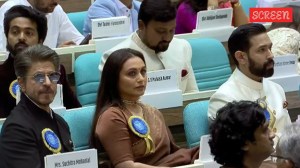A history of intelligence failure
It is now widely accepted that both American and British intelligence failed in assessment of presence of weapons of mass destruction in Ira...

It is now widely accepted that both American and British intelligence failed in assessment of presence of weapons of mass destruction in Iraq during 2002-03. It is also agreed that some of that faulty intelligence was fed by interested parties. This intelligence failure was subjected to investigation both in US and UK and has led to various reforms.
Recently, the office of the Historian, Bureau of Public Affairs, United States Department of State, released documents relating to US foreign relations in the period 1969-76. Volume XI of those documents relate to the South Asia crisis, 1971. According to the summary, ‘‘New evidence suggested to Nixon and Kissinger that rather than being restrained by Moscow, India was contemplating expanded military operations against West Pakistan.’’
An intelligence report of a briefing that Indira Gandhi gave in early December indicated that India enjoyed strong support from the Soviet Union which had promised to counter-balance any move China might make against India in support of Pakistan. With that much support Indira outlined her war aims: She would not accept a settlement until Bangladesh was liberated, ‘‘the Southern area of Azad Kashmir’’ was liberated and the Pakistani armoured and Air Force strength was destroyed to prevent any future challenge to India.
Nixon and Kissinger took this as proof that India planned not only to foster the independence of East Pakistan, but to use the opportunity to inflict a crushing military defeat on Pakistan, which would lead to the break-up of West Pakistan. Kissinger attributed to the Indira Gandhi government the goal of Balkanising West Pakistan. If the crisis resulted in the dismemberment of Pakistan, Kissinger worried that China might conclude that the US was ‘‘just too weak’’ to prevent the humiliation of an ally. He felt that the Chinese would then look to other options ‘‘to break their encirclement’’. He concluded that the situation represented ‘‘a big watershed’’. Various actions of Kissinger just as the Enterprise mission, his suggestion to China to apply military pressure on India and his direct pressure on the Soviet Union all followed the above assessment based on intelligence which at that time was claimed to have been obtained by a leakage at the Indian Cabinet level.
Seymour Hersh in his book on Kissinger, claimed that the source was Morarji Desai, who was not at all in the Cabinet and at that time had no friend in the Cabinet Committee on Political Affairs. In fact the intelligence on which Kissinger was acting in 1971 was perhaps of a worse quality than the one on which the US concluded that Iraq had WMD in 2002-03. In other words the CIA had a long history of such poor quality intelligence collection.
After the war of 1971, I was deputed by defence secretary K B Lall to write a history of the war for the Annual Report of the Ministry of Defence of 1972. I was briefed by Maj General I S Gill who was then Director of Military Operations. The operational directives did not include such war aims as Kissinger claimed Indira Gandhi spelt out. In fact, they were very modest. In the East it was to capture as much territory as possible. In the West it was restricted to carry out the fighting to the extent possible on Pakistani soil. General Jacob, who was then Chief of Staff of our Eastern Command, has brought out in his book, Surrender at Dacca, that the war aim did not specifically include the capture of Dacca.
In those days, I was the director of the Institute for Defence Studies and Analyses and Y B Chavan, then finance minister and the original founder of the Institute in 1965 as defence minister, was the president. I had given an interview to the Hindustan on December 6, 1971 urging that the Indian Army should drive upto the Indus river in Sind to have an effective say in the post-war government-making in West Pakistan. Since, in my view, Z A Bhutto was the instigator of the Bangladesh crackdown we should try to keep him out of the government. That evening, Chavan called me and solicited my suggestions for schemes which would boost the morale of the army. I suggested two steps which I had tried to push through as a deputy secretary in the Ministry of Defence during 1962 and 1965 wars and had failed because of opposition from the Finance Ministry. They were that all disabled servicemen should be given lifetime employment and children of servicemen killed in action should get government-funded university education to the extent they deserved. I told Chavan he could then implement them as he was the finance minister. He did.
He then asked for my assessment on the war. I said that our victory in the east was certain. In the west I repeated what I had told the Hindustan that Indian Army should drive up to the Indus River. Chavan asked me to meet him after a week.
When I met him on December 13, Delhi was full of rumours that a ceasefire was imminent. I expressed my apprehension that this was being done under US pressure and because of the Enterprise mission threat. Chavan said that the victory in the East Bengal would still be the biggest victory in our history for centuries.
When I asked him about my earlier discussion with him, he said he had discussed that proposal with the concerned authorities. According to them, the resources at the disposal of General Bewoor, the Southern Army Commander, operating in Sind sector, were not adequate to enable him to drive up to the Indus River. Therefore he said we had to be content with the victory in the East.
While Chavan, a member of the CCPA was explaining to me that we did not have resources to drive up to the Indus River, Kissinger was fearing Indira Gandhi destroying Pakistani armour and Air Force and Balkanising West Pakistan. On the basis of that assessment, he was egging on China to move against India risking the possibility of a US-Soviet confrontation.
The US State Department summary says further, quoting Kissinger on December 12, 1971: ‘‘If the Soviets move against them in these conditions and succeed, that will be the final showdown, and if they succeed, we will be finished.’’ He further added that ‘‘If the Russians get away with facing down the Chinese and the Indians get away with licking the Pakistanis — we may be looking down the gun barrel.’’ In the end, they concluded, according to the summary, that the projected confrontation with the Soviet Union would not involve a nuclear exchange.
The Chinese refused to take the American advice and move against India militarily. General Niazi decided sensibly to surrender at Dacca. Indira Gandhi promptly and generously offered the ceasefire to Pakistan and the dire consequences envisaged by Nixon and Kissinger did not take place. But for the good sense displayed by the Chinese in rejecting Kissinger’s advice to move against India, the disastrous consequences of the intelligence failure of 1971 would have been much graver than the one in respect of Iraq in 2002-03.
Photos



- 01
- 02
- 03
- 04
- 05



























